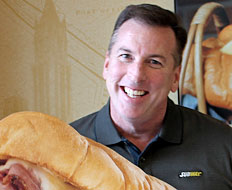William Bruce says franchisees can save money in everything they do. And throughout his career, Bruce has helped several quick-serve brands, including El Pollo Loco, Arby’s, and Paradise Bakery, do exactly that.
Today, Bruce is COO of Abundant Brands, a developing agent and privately held restaurant franchisor. The company owns dozens of Subway units and sub-franchises hundreds more. It also includes quick-serve concepts like Costa Vida and Roxberry Juice in its portfolio. After joining Abundant Brands, Bruce helped increase profit margins for the company’s Subway units by 10 percentage points in just two years’ time.
Bruce discusses how to maintain franchise operations with simple, old-school tactics that can reinvigorate business growth.
1. Find the weak spots
When I came into Abundant Brands, the company had already been around for 25 years. Most of the time, when a company is run consistently for this long, it’s hard to evoke change. Today, we have more than 239 Subway units in Utah and own 46.
Coming into the company, I noticed we were bringing in about 8 percent of profitability with regard to our Subway franchises. I came from strict companies with stricter policies and realized it was time for a paradigm shift to increase our numbers.
There were some visible problems right off the rip, like a high amount of people behind the counter and little to no customers in the restaurant itself. Some units didn’t even have a cash-control system in place for the end-of-day numbers. These small business errors can lead to big losses. Something as simple as cash control can lead to a $20–$40 loss per day. These and other issues are all over the place, and all franchisees need to do is recognize the problems.
Personally, I had to convince my partners to promote these changes. I took a week and visited all of our Subway units. I made notes of food and labor costs of each unit’s operations and developed a labor matrix for the Subway units. I said to myself, “Let’s control the things we can control.” It’s been really great to watch the changes manifest in such a positive way, and it’s simple fixes that go a long way in this industry.
2. Commit to checklists
Restaurant managers have a lot to uphold when it comes to running their unit. Food and labor costs are the big ones, but a lot of franchisees do additional business, like fundraising or catering. For any franchisee and for whatever specific business practice they’re focused on, commit to the checklists; hours, cash control, stock levels, and end-of-day closing duties, to name a few.
Checklists are key in maintaining efficient operations because you simply can’t go wrong. Lots of people, including myself, make a checklist for their daily life. Whether it is a planner or personal assistant, you effectively check things off on a daily basis.
It needs to be the same for your business. Nothing can fall through the cracks this way. It’s old school, but it works and numbers can go up by simple tracking.
3. Renegotiate real estate contracts
For most franchisees, food and labor take up about 66 percent of operations. The other 34 percent seems to be held up in land or building costs. Franchisees really need to revisit these numbers if it has been a while since they’ve looked at them.
Real estate value today is different than market value in the past, and there needs to be renegotiating if it’s in your favor. Real estate costs will eat up your operations and even with the right checklists in place, the money just won’t show up the same.
4. Be flexible on a site-by-site basis
Some franchisees or business owners might run into some difficult site-specific issues. For instance, I had a labor matrix all ready to go for our Subway units across the board, but the hours I wanted to instate wouldn’t work for the units inside the malls or Wal-Mart. Or you might have to cut some hours and reduce staff to efficiently operate in a particular district.
You’re not going to get everyone to buy in right away. Sometimes you’ll have to grab the group and motivate as a leader. Ask for feedback from the team. Integrate them in your decision-making process.
5. Be ready for change
Systems do change. Moreover, systems should change over time and they’ll change fast. Again, you can’t fail with the proper checklist, but they are subject to change and need to be constantly updated, just like the avenues of today’s social media marketing. Not being ready for change is no excuse for poor operations. Even something completely out of your control should never have an effect on the efficiency of your business.
For instance, here in Utah, they’re always tearing up roads or new schools are going up, which takes a big chunk of potential customers somewhere else. These things happen, but if you are consistent as to how you run your business, those external factors can be inconsequential. You can still control what happens inside your unit on a consistent basis.
Operations will also improve if you as a franchisee are consistently developing. Since our company houses more than one concept, we have to train owners. We develop franchisees on all the controls we stress and strive to maintain.
If a person doesn’t have time to develop or isn’t willing to go through a training program, it’s a big red flag for us because we know that he or she won’t be able to maintain the systems we have in place to be efficient. Develop as a franchisee and build a relationship with the franchisor.












